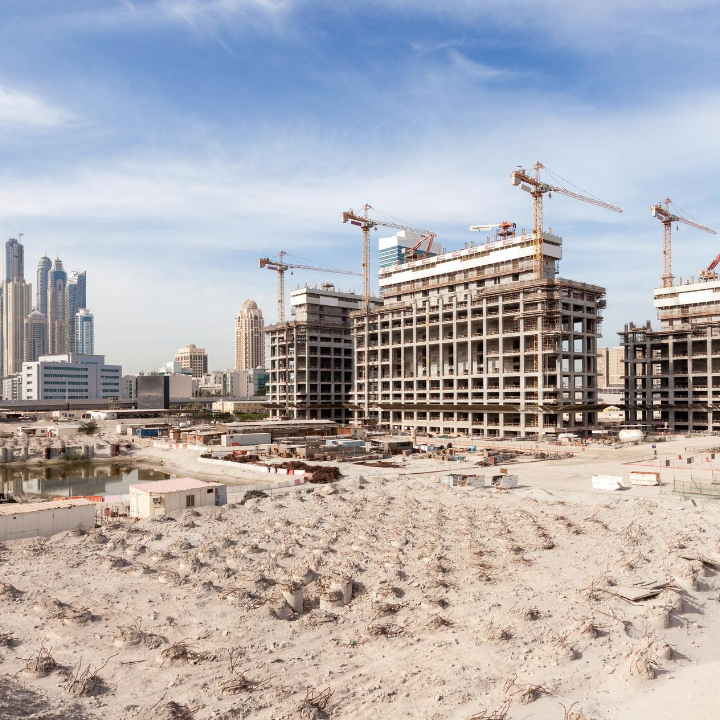On Shaky Ground: Migrant Workers’ Rights in Qatar & UAE Construction

Photo: typhoonski, Getty Images, via Canva
Prompted by international scrutiny of working conditions on flagship projects in Qatar and the UAE, in 2016, the Business & Human Rights Resource Centre surveyed construction companies on their approach to safeguarding migrant workers’ rights in both countries.
Two years on and with a second survey, our findings show that while a consistent but small group of construction companies demonstrate real commitment to tackling the risks to migrant workers in their operations, the overwhelming majority operate with high risks to human rights and continued disregard for workers’ welfare. In both years, more than 70% of surveyed companies did not respond and over 60% did not have a public commitment to human rights.
As Expo 2020 in Dubai and the 2022 Qatar World Cup draw closer, it is clear that the issues pertaining to migrant workers’ rights in the construction sector go well beyond these events and call for widespread and long-term change in industry practice.
This briefing analyses the survey responses and public human rights commitments of construction companies with current projects in the region and makes recommendations to companies, clients and governments to advance the rights of migrant workers.
Since producing the report, we have recieved updates and clarifications detailed below.
Key Recommendations:
Companies should
- Develop and implement labour rights and welfare policies specific to the heightened human rights risks to migrant workers in Qatar and the UAE.
- Take urgent action to introduce protections for migrant workers from heat stress and late payment of wages in the supply chain, establish systematic, unconditional and timely procedures for workers to change employment, and convene worker committees as a means of collective representation and bargaining.
- Introduce monitoring systems to check subcontractor compliance with company welfare policies, including mechanisms to build the capacity of subcontractors to adopt better practices and where necessary, penalties for non-compliance.
- Collaborate with other construction companies to collectively identify risks in Qatar and the UAE and influence the labour practices of subcontractors, share and develop good practice and guidance, and push for pre-competitive industry-wide labour standards within their sector, and with the governments
Clients should
- Award contracts to construction companies with demonstrable labour rights and welfare policies and procedures in place and require existing contractors to embed labour rights throughout their policies and operations.
- Ring-fence the cost of worker welfare/labour rights in tendering documents and account for it in contract prices so that companies in their supply chain can make the necessary investments in fair wages, recruitment and worker welfare.
- Ensure prompt payments to contractors to prevent wage delays in the supply chain.
Governments should
- In their capacity as construction clients, reform government procurement practices to incorporate human and labour rights standards and create a level playing field for construction companies on worker welfare.
- Introduce legislation:
- to regulate payments and increase cash flow in construction supply chains
- requiring employers to protect workers from heat stress risks throughout the year
- to allow migrant workers to transfer employment without requiring their employer’s permission and at any time during their contract period
- Regulate the construction industry through stricter enforcement of existing labour laws and application of penalties for labour rights violations.
-----
Company Updates
Vinci confirmed that QDVC's heat stress policy and prevention measures are implemented throughout the year and that one of the indexes used is the WBGT (Wet Bulb Globe Temperature) that measures temperature, humidity and direct sunlight.
In November 2021 PORR provided this statement: In both Qatar and the UAE, PORR ensures that all legal and internal guidelines and directives are upheld at the highest level. Even though labour law in the UAE diverges slightly from that in Qatar, the same approaches and minimum standards apply in principle. In the UAE, PORR exclusively works with personnel from manpower leasing agencies. They are selected in line with stringent criteria in order to guarantee the high PORR standards. Here PORR experts from the HR department examine all contract offers together with two managing directors. This three-way check ensures that any possible irregularities are excluded in advance. In Qatar, worker rights are governed by legislation such as the Dhaka Principles, whereby the PORR Qatar guidelines also address the respective issues. All workers have guaranteed freedom of movement and receive an original copy of their work contract. They are informed about all legal occupational health and safety aspects and retain possession of their passport and other personal documents. A complaints reporting system has also been established for workers. In Qatar the workers’ basic pay exceeds the newly introduced minimum wage and it is also well above the statutory minimum in the UAE. In addition, accommodation, transport, food and sports facilities, for example, are provided free of charge. Different ethnic requirements are catered to in the choice of food and there is freedom to practice any religion. The Workers Welfare Forum aims to identify possible problems early on and take proactive steps to solve them. Particular attention is paid to protecting workers and ensuring their safety on construction sites. An internal training programme specifically focused on occupational safety provides additional support when realising projects. Staff receive further education and training through a range of internal and external measures.